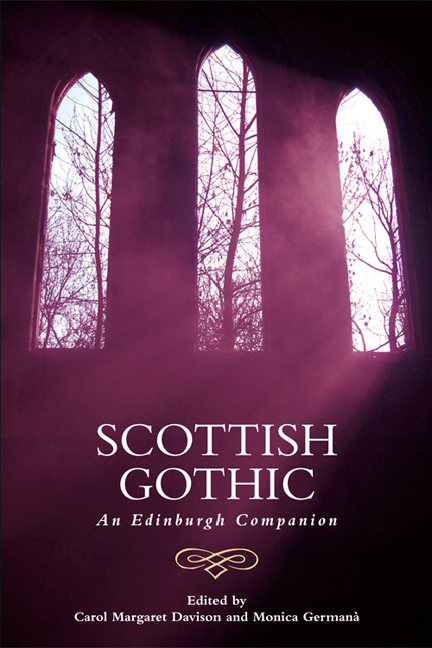Book contents
- Frontmatter
- Contents
- Acknowledgements
- 1 Borderlands of Identity and the Aesthetics of Disjuncture: An Introduction to Scottish Gothic
- 2 ‘The Celtic Century’ and the Genesis of Scottish Gothic
- 3 The Politics and Poetics of the ‘Scottish Gothic’ from Ossian to Otranto and Beyond
- 4 Robert Burns and the Scottish Bawdy Politic
- 5 Scottish Gothic Drama
- 6 Scottish Gothic Poetry
- 7 Calvinist and Covenanter Gothic
- 8 Gothic Scott
- 9 Gothic Hogg
- 10 ‘The Singular Wrought Out into the Strange and Mystical’: Blackwood's Edinburgh Magazine and the Transformation of Terror
- 11 Gothic Stevenson
- 12 J. M. Barrie's Gothic: Ghosts, Fairy Tales and Lost Children
- 13 The ‘nouveau frisson’: Muriel Spark's Gothic Fiction
- 14 Scottish Gothic and the Moving Image: A Tale of Two Traditions
- 15 New Frankensteins; or, the Body Politic
- 16 Queer Scottish Gothic
- 17 Authorship, ‘Ghost-filled’ Islands and the Haunting Feminine: Contemporary Scottish Female Gothic
- Notes on Contributors
- Index
3 - The Politics and Poetics of the ‘Scottish Gothic’ from Ossian to Otranto and Beyond
Published online by Cambridge University Press: 20 December 2017
- Frontmatter
- Contents
- Acknowledgements
- 1 Borderlands of Identity and the Aesthetics of Disjuncture: An Introduction to Scottish Gothic
- 2 ‘The Celtic Century’ and the Genesis of Scottish Gothic
- 3 The Politics and Poetics of the ‘Scottish Gothic’ from Ossian to Otranto and Beyond
- 4 Robert Burns and the Scottish Bawdy Politic
- 5 Scottish Gothic Drama
- 6 Scottish Gothic Poetry
- 7 Calvinist and Covenanter Gothic
- 8 Gothic Scott
- 9 Gothic Hogg
- 10 ‘The Singular Wrought Out into the Strange and Mystical’: Blackwood's Edinburgh Magazine and the Transformation of Terror
- 11 Gothic Stevenson
- 12 J. M. Barrie's Gothic: Ghosts, Fairy Tales and Lost Children
- 13 The ‘nouveau frisson’: Muriel Spark's Gothic Fiction
- 14 Scottish Gothic and the Moving Image: A Tale of Two Traditions
- 15 New Frankensteins; or, the Body Politic
- 16 Queer Scottish Gothic
- 17 Authorship, ‘Ghost-filled’ Islands and the Haunting Feminine: Contemporary Scottish Female Gothic
- Notes on Contributors
- Index
Summary
As Murray Pittock has cogently argued, the eighteenth century was ‘the historic battleground of the formation of Great Britain’ (1997: 1). In terms of Anglo-Scottish relations during this era, a shift occurred that saw the military battlefields of Culloden and Prestonpans give way to more intellectual battlefields and ‘culture wars’ (Moore 2003a: 46) where the question of national superiority rested upon the quality and innovation of cultural productions both ancient and modern, some of which, like James Macpherson's Ossian, notably chronicled martial struggles. Nationalist statements proliferated about literature, especially at midcentury, such as David Hume's comment in private correspondence in 1757 in the wake of the theatrical production of John Home's Douglas (1756), that Scots had become, despite the devastating losses of their ‘Princes, … Parliaments, … Independent Government’, in combination with the fact that they spoke ‘a very corrupt Dialect of the [English] Tongue’, ‘the People most distinguish'd for Literature in Europe’ (1932, vol. 1: 255). Lord Lyttelton echoed this viewpoint in his Dialogues of the Dead (1760), declaring that the Scots had ‘discovered such Talents in all Branches of Literature as might render the English jealous of being excelled by their genius, if there could remain a Competition, when there remains no Destruction between the two Nations’ (1970: 283). As various scholars have noted, national histories, which were published in unprecedented numbers over the course of the eighteenth century, were key battlegrounds that served either as unifying narratives in support of a sense of coherent Britishness post-Union, or divisive chronicles that underscored ethnic differences and consolidated national and cultural hierarchies. What appeared to be minor debates relating to ethnography, literature and history were pivotal in the development of the idea of Britishness and national identity, and reached an explosive height during the Scotophobic 1760s amidst ‘the bitter factionalism of contemporary English politics’ (Hook 1986: 40). Of especial importance to cultural critics is the fact that literature played such a vital role in the development of new nationalist discourses (Groom 1996: 289) during a period that evidenced the efflorescence of Scottish Enlightenment thought and the seeds of Scottish Romanticism, an aesthetic that ‘is still undergoing a process of conceptual recognition’ (Pittock 2011: 6), alongside the development of various innovative novelistic forms, including the Gothic.
- Type
- Chapter
- Information
- Scottish GothicAn Edinburgh Companion, pp. 28 - 41Publisher: Edinburgh University PressPrint publication year: 2017



